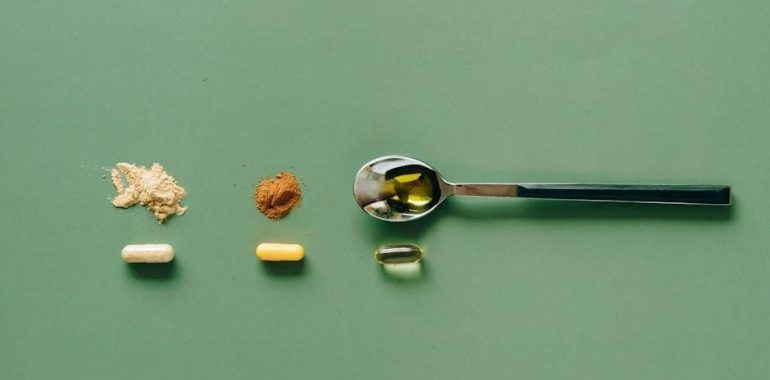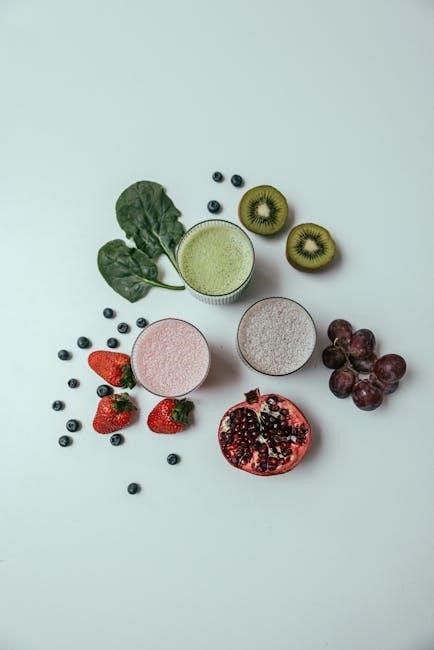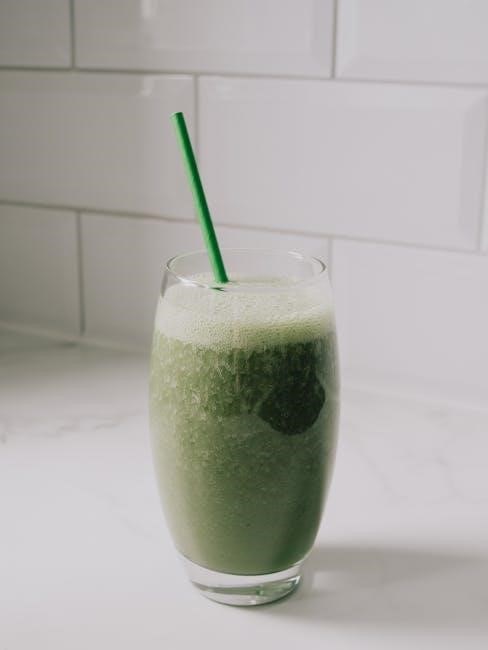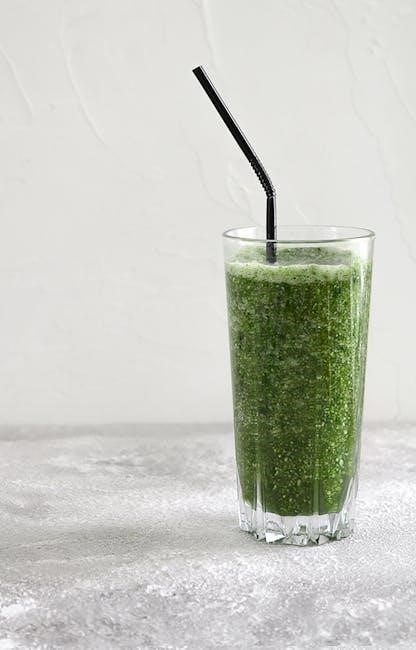cortisol detox diet plan pdf

cortisol detox diet plan pdf
Cortisol, the primary stress hormone, regulates various bodily functions․ Elevated levels can lead to fat accumulation and energy crashes․ Managing cortisol through diet supports overall well-being and hormonal balance․
1․1 Understanding Cortisol: The Stress Hormone
Cortisol, produced by the adrenal glands, is a vital hormone that regulates blood sugar, metabolism, and immune responses․ While essential for short-term stress, chronically elevated cortisol levels can disrupt bodily functions, leading to fatigue, weight gain, and mood imbalances, making it crucial to manage through diet and lifestyle changes․
1․2 How Cortisol Affects Metabolism, Mood, and Overall Health
Chronically elevated cortisol disrupts metabolism, promoting belly fat storage and slowing digestion․ It can also alter mood, causing anxiety and irritability, while impairing immune function and cognitive clarity․ Prolonged exposure may lead to energy crashes and increased cravings for unhealthy foods, necessitating dietary interventions to restore balance․

The Benefits of a Cortisol Detox Diet Plan
A cortisol detox diet helps reduce stress, improve energy, and support adrenal function․ It promotes hormonal balance, enhancing overall health by focusing on nutrient-rich foods like antioxidants, fiber, and healthy fats․
2․1 Balancing Cortisol Levels for Better Hormonal Health
A cortisol detox diet helps stabilize cortisol levels, reducing inflammation and supporting adrenal function․ By incorporating nutrient-rich foods like leafy greens, omega-3s, and fiber, it promotes hormonal balance, improving energy, mood, and overall well-being while addressing the root causes of stress-related health issues․
2․2 Reducing Stress and Anxiety Through Nutrition
Nutrition plays a key role in managing stress and anxiety by providing essential nutrients for mental health․ A cortisol detox diet rich in antioxidants, magnesium, and omega-3s supports brain function, calming the nervous system and promoting relaxation, thereby reducing stress and anxiety naturally․
2․3 Improving Metabolism and Energy Levels
A cortisol detox diet focuses on nutrient-dense foods that stabilize blood sugar and support adrenal function․ By incorporating leafy greens, omega-3s, and fiber-rich foods, the diet helps improve metabolism and sustain energy levels, preventing cortisol-induced crashes and promoting long-term vitality and balance․
Foods That Help Lower Cortisol Levels
Leafy greens, berries, nuts, and fatty fish are key foods that help reduce cortisol․ These nutrient-rich options support adrenal health and promote hormonal balance naturally․
3․1 Anti-Inflammatory Foods: Leafy Greens, Berries, and Nuts
Leafy greens like spinach and kale are rich in magnesium and folate, which help regulate cortisol․ Berries, packed with antioxidants like vitamin C and flavonoids, combat oxidative stress․ Nuts and seeds, such as almonds and chia seeds, provide healthy fats and magnesium, reducing inflammation and supporting hormonal balance․
3․2 Omega-3 Rich Foods: Salmon, Walnuts, and Chia Seeds
Omega-3 fatty acids in salmon, walnuts, and chia seeds reduce inflammation and stress markers․ These foods support brain health, lower cortisol levels, and promote a balanced hormonal response, making them essential for a cortisol detox diet and overall well-being․
3․3 Fiber-Rich Foods: Whole Grains, Legumes, and Vegetables
Fiber-rich foods like whole grains, legumes, and vegetables support healthy digestion and blood sugar balance․ They help stabilize cortisol levels by promoting a steady energy supply and reducing inflammation․ Incorporating these foods into your diet aids in maintaining a balanced gut microbiome, which is crucial for overall hormonal and adrenal health․
3․4 Healthy Fats: Avocados, Olive Oil, and Fatty Fish
Avocados, olive oil, and fatty fish are rich in healthy fats that reduce inflammation and support adrenal function․ These foods promote brain health and stabilize cortisol levels, helping to manage stress and improve metabolic function․ Including them in your diet fosters a balanced hormonal environment and enhances overall well-being․
Foods to Avoid on a Cortisol Detox Diet
Eliminate processed foods, refined sugars, high caffeine, alcohol, and saturated fats․ These can disrupt cortisol balance, increase inflammation, and hinder adrenal recovery, worsening stress-related symptoms․
4․1 Processed Foods and Refined Sugars
Processed foods and refined sugars trigger inflammation and cortisol spikes․ They cause blood sugar imbalances, disrupt adrenal function, and prolong stress responses․ Avoid sugary snacks, sodas, and packaged meals to maintain hormonal balance and support detoxification․ Opt for whole, nutrient-dense foods instead to promote stable cortisol levels and overall well-being․
4․2 High-Caffeine and High-Alcohol Beverages
High-caffeine and alcohol beverages can disrupt cortisol balance by interfering with sleep quality and increasing stress hormones․ Excessive caffeine mimics stress responses, while alcohol impairs adrenal function․ Limiting these beverages supports hormonal stability and promotes detoxification․ Opt for herbal teas, water, or decaf options to maintain cortisol balance and overall well-being․
4․3 Foods High in Saturated and Trans Fats
Foods rich in saturated and trans fats, such as processed meats and fried foods, can increase inflammation and disrupt cortisol balance․ These fats impair adrenal function, exacerbating stress responses․ Opting for healthier fats like avocados and olive oil supports hormonal stability and promotes a detox-friendly diet․

Sample 7-Day Cortisol Detox Meal Plan
A structured 7-day plan with balanced nutrition, anti-inflammatory ingredients, and stress-reducing foods to help lower cortisol levels and promote overall well-being and sustained energy․
5․1 Breakfast Options: Smoothies, Omelets, and Whole Grain Recipes
Start your day with nutrient-rich breakfasts that stabilize cortisol levels․ Green smoothies with spinach, banana, and chia seeds provide antioxidants and fiber․ Wholesome omelets with vegetables like bell peppers and onions offer protein and vitamins․ Whole grain options, such as oatmeal or avocado toast, promote sustained energy and support hormonal balance throughout the morning․
5․2 Lunch Ideas: Salads, Grilled Proteins, and Vegetable-Based Meals
Nourish your body with balanced lunches that aid in cortisol regulation․ Fresh salads with leafy greens, berries, and nuts provide essential vitamins and antioxidants․ Grilled proteins like salmon or chicken offer omega-3s and lean muscle support․ Vegetable-based meals, such as quinoa bowls or stir-fries, ensure sustained energy and promote a healthy hormonal response during the day․
5․3 Dinner Recipes: Baked Fish, Quinoa Bowls, and Steamed Vegetables
Conclude your day with nutrient-rich dinners that support cortisol balance․ Baked cod or salmon with herbs provides omega-3s and antioxidants․ Quinoa bowls with roasted vegetables like sweet potatoes and Brussels sprouts offer fiber and nutrients․ Steamed vegetables, such as asparagus or broccoli, paired with olive oil or avocado, promote digestion and relax the body, aiding in stress reduction naturally․
5․4 Snacks: Nuts, Seeds, and Fresh Fruits
Healthy snacks like almonds, walnuts, and pumpkin seeds provide magnesium and omega-3s, supporting cortisol balance․ Fresh fruits such as berries, apples, and citrus are rich in antioxidants and fiber, aiding digestion․ These snacks stabilize blood sugar, reduce stress, and maintain energy levels without triggering cortisol spikes, making them ideal for a detox diet plan․
Tips for Creating a Personalized Cortisol Detox Diet Plan
Creating a personalized cortisol detox diet involves identifying nutritional needs, incorporating mindful eating, and staying hydrated․ Tailor your plan to suit lifestyle and preferences for optimal results․
6․1 Identifying Your Nutritional Needs and Preferences
Identify your nutritional needs by assessing dietary preferences and health goals․ Consider allergies, intolerances, and lifestyle; Incorporate foods rich in omega-3s, fiber, and antioxidants, while avoiding triggers like processed sugars and caffeine to create a balanced cortisol detox plan tailored to your body’s requirements for optimal hormonal health and stress reduction․
6․2 Incorporating Mindful Eating and Portion Control
Mindful eating focuses on savoring meals and recognizing fullness cues, reducing overeating․ Portion control ensures balanced nutrient intake without excess․ This practice helps maintain stable energy levels and supports cortisol balance, promoting a healthier relationship with food and overall well-being in your detox plan․
6․3 Staying Hydrated and Limiting Caffeine Intake
Staying hydrated is essential for maintaining bodily functions and hormonal balance․ Drinking plenty of water supports detoxification and overall health․ Limiting caffeine intake is crucial, as excessive consumption can raise cortisol levels․ Moderation is key to avoiding stress-induced spikes, while herbal teas or water offer healthier alternatives to support your cortisol detox plan effectively․
The Role of Lifestyle Changes in Cortisol Detox
Lifestyle changes play a crucial role in managing cortisol levels․ Stress management, quality sleep, and regular exercise are key pillars for balancing hormones and promoting overall well-being․
7․1 Importance of Sleep and Relaxation Techniques
Quality sleep is vital for cortisol regulation․ During sleep, the body repairs itself, balancing hormones․ Chronic sleep deprivation can disrupt cortisol levels, leading to increased stress and fatigue․ Incorporating relaxation techniques like meditation and deep breathing helps reduce stress, promoting better sleep quality and overall hormonal balance, essential for a cortisol detox plan․
7․2 Exercise and Physical Activity for Cortisol Balance
Regular physical activity helps maintain healthy cortisol levels by reducing stress and improving mood․ Moderate exercises like yoga, walking, and swimming are ideal, as they promote relaxation without overtaxing the body․ Over-intensive workouts can temporarily raise cortisol, so balancing activity levels is key for long-term hormonal balance and overall well-being․
7․3 Managing Stress Through Meditation and Deep Breathing
Meditation and deep breathing are effective tools for stress reduction, directly impacting cortisol levels․ These practices calm the mind, slow breathing, and activate the parasympathetic nervous system, promoting relaxation․ Regular mindfulness exercises reduce cortisol over time, improve emotional resilience, and enhance mental clarity, helping to manage stress more effectively and maintain hormonal balance․
Cortisol Detox Smoothies and Juices
Cortisol detox smoothies and juices are packed with antioxidants and nutrients to reduce inflammation, promote relaxation, and support adrenal health, helping to balance cortisol levels naturally․
8․1 Recipes for Anti-Stress Smoothies
Anti-stress smoothies blend nutrient-rich ingredients like spinach, bananas, and chia seeds to reduce cortisol and promote relaxation․ Try a green smoothie with spinach, banana, almond milk, and chia for a calming start․ Berry-based smoothies with blueberries and Greek yogurt also support adrenal health, helping to lower stress levels naturally and effectively․
8․2 Green Juices for Detoxification and Energy
Green juices, packed with spinach, kale, celery, and cucumbers, are rich in antioxidants and fiber, promoting detoxification․ These juices support adrenal function, reduce inflammation, and boost energy levels, making them an ideal addition to a cortisol detox diet plan for natural stress relief and overall vitality․

Cortisol-Friendly Snacks and Desserts
Nourish your body with cortisol-friendly snacks like nuts, seeds, and fresh fruits, and indulge in low-sugar desserts such as dark chocolate and Greek yogurt with berries for a guilt-free treat․
9․1 Healthy Snack Options: Nuts, Seeds, and Fresh Fruits
Nuts like almonds and walnuts, packed with magnesium and omega-3s, help regulate cortisol․ Seeds such as chia and flax offer fiber and antioxidants․ Fresh fruits like blueberries and berries provide vitamins and anti-inflammatory properties, making them ideal snacks for balancing stress hormones and maintaining energy levels naturally․
9․2 Low-Sugar Desserts: Dark Chocolate, Greek Yogurt, and Berries
Dark chocolate with 70% cocoa contains flavonoids that reduce stress․ Greek yogurt paired with berries offers probiotics and antioxidants, supporting gut health․ These desserts satisfy cravings while maintaining low sugar intake, helping to stabilize cortisol levels and promote a balanced diet without compromising taste or nutritional benefits․

The Importance of Meal Timing and Frequency
Meal timing and frequency play a crucial role in stabilizing cortisol levels․ Eating regular, balanced meals helps maintain metabolic balance and energy levels, while avoiding late-night meals prevents cortisol spikes․
10․1 Eating Regular Meals to Stabilize Cortisol Levels
Eating regular meals helps stabilize cortisol levels by maintaining blood sugar balance and preventing extreme fluctuations․ Consistent nourishment supports adrenal function, reducing stress-induced cortisol spikes and promoting a steady energy supply throughout the day․
10․2 Avoiding Late-Night Eating and Heavy Meals
Late-night eating and heavy meals can disrupt digestion and elevate cortisol levels, affecting sleep quality․ Prioritizing lighter, balanced dinners and finishing meals earlier supports hormonal balance, enhances metabolism, and promotes restful sleep, crucial for overall cortisol regulation and well-being․
Supplements to Support Cortisol Detox
Supplements like omega-3 fatty acids, magnesium, and adaptogenic herbs support cortisol detox by reducing stress, balancing hormones, and enhancing adrenal function for improved overall health․
11․1 Omega-3 Fatty Acids and Magnesium
Omega-3 fatty acids, found in fish and nuts, reduce inflammation and cortisol levels․ Magnesium supports adrenal function, eases stress, and regulates the nervous system, promoting hormonal balance and relaxation․
11․2 Vitamin C and Adaptogenic Herbs
Vitamin C supports adrenal function, reducing cortisol production and aiding stress recovery․ Adaptogenic herbs like Ashwagandha and Rhodiola help regulate cortisol levels, enhancing resilience to stress and promoting hormonal balance․ These natural supplements work synergistically to support overall well-being and reduce the impact of chronic stress on the body․
Tracking Progress and Adjusting the Plan
Monitoring cortisol levels and physical changes helps identify progress․ Adjusting the diet based on individual results ensures sustained effectiveness and optimal hormonal balance over time․
12․1 Monitoring Cortisol Levels and Physical Changes
Regularly monitoring cortisol levels and physical changes helps assess progress․ Improvements in energy, reduced bloating, and better sleep are positive signs․ Cortisol testing through urine or saliva samples can confirm hormonal shifts․ Tracking these changes ensures the diet’s effectiveness and guides necessary adjustments for optimal results․
12․2 Adjusting the Diet Based on Individual Results
Personalizing your diet plan based on progress helps maximize results․ Tailor macronutrient intake and incorporate anti-inflammatory foods like leafy greens․ Stay hydrated and limit caffeine․ Adjust portion sizes and meal timing as needed․ Consistency is key, and consulting a nutritionist can further refine your approach for optimal cortisol balance and overall health․
A balanced diet and healthy lifestyle are crucial for long-term cortisol management․ Stick to your plan, stay consistent, and consider professional guidance for personalized adjustments․ Achieve lasting hormonal balance and overall well-being with dedication and mindful choices․
13․1 Maintaining a Balanced Diet for Long-Term Health
Maintaining a balanced diet is essential for long-term health and cortisol regulation․ Focus on whole, nutrient-rich foods, stay hydrated, and practice mindful eating․ Avoid processed sugars, caffeine, and alcohol to support adrenal function and stabilize cortisol levels, ensuring sustained energy and overall wellness․
13․2 Encouraging a Holistic Approach to Cortisol Management
A holistic approach combines nutrition, sleep, and stress management to regulate cortisol․ Pair a balanced diet with regular physical activity, relaxation techniques, and adequate rest․ This comprehensive strategy supports adrenal health, promotes emotional resilience, and fosters long-term hormonal balance for overall well-being․